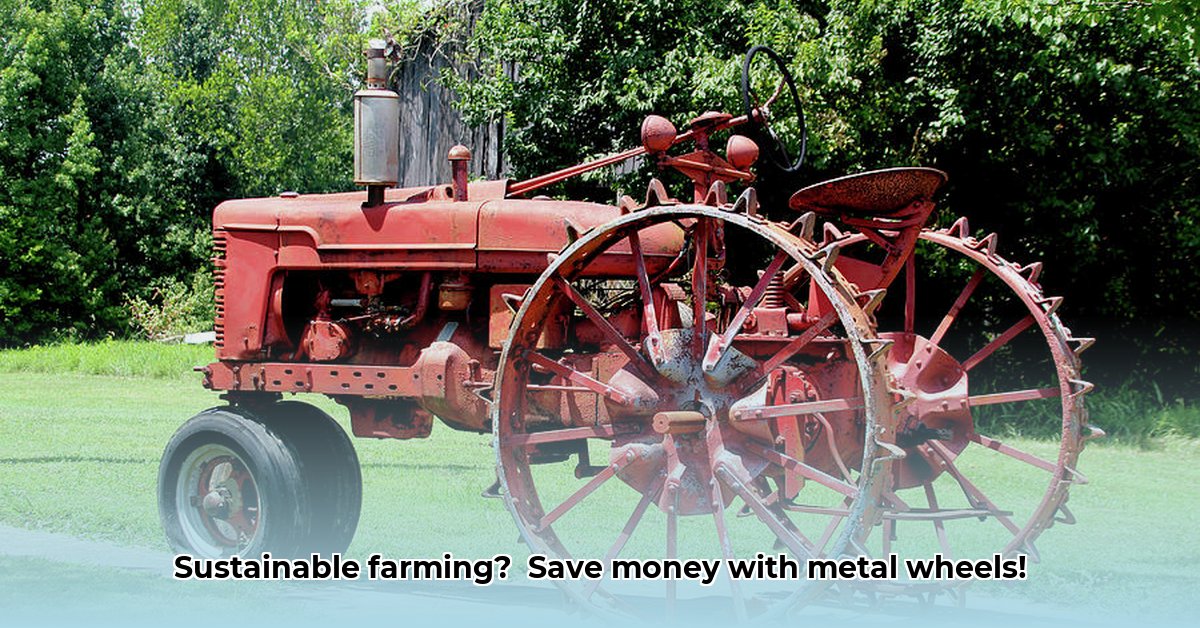
Tractor Metal Wheels: A Sustainable and Cost-Effective Solution
Farming demands careful management of resources, and even seemingly small details like tractor wheels can significantly impact both your budget and environmental footprint. This guide explores the advantages of using used tractor metal wheels, highlighting the cost savings and sustainable practices involved. We'll cover everything from sourcing and inspection to responsible disposal, empowering you to make informed decisions that benefit your farm and the planet. For added weight and stability, consider tractor wheel weights.
The Used Tractor Wheel Market: An Overview
The market for pre-owned agricultural wheels and tires is dynamic and surprisingly large, although precise quantitative data remains elusive. Online marketplaces and specialized suppliers like Ag Wheel Express and Tractor Parts ASAP are major players. Regional variations in price and availability reflect local economic conditions and harvesting cycles. Further research is needed to fully quantify the market's size and impact. However, the sheer volume of available used wheels clearly demonstrates the potential for significant cost savings for farmers.
New vs. Used: A Comprehensive Cost-Benefit Analysis
The decision between new and used tractor metal wheels hinges on a careful cost-benefit assessment. While new wheels offer higher initial reliability and longer lifespans, used wheels provide substantial upfront cost savings. However, potential risks associated with used wheels, such as premature failure and safety hazards, necessitate thorough inspection and careful consideration.
| Feature | New Tractor Metal Wheels | Used Tractor Metal Wheels |
|---|---|---|
| Upfront Cost | High | Significantly lower |
| Reliability | High; often with warranties | Variable; depends on condition and inspection |
| Lifespan | Typically longer | Variable; depends on condition and maintenance |
| Safety | Generally higher | Requires meticulous inspection; potential safety risks if damaged |
| Resale Value | Holds value better | Lower resale value |
| Environmental Impact | Higher due to manufacturing and transportation | Lower if sourced and disposed of responsibly |
Rhetorical Question: Considering the significant upfront cost savings, is the potential risk of using used wheels outweighed by the long-term financial gains and environmental benefits?
Quantifiable Fact: The upfront cost of new wheels can be up to 70% higher than used alternatives.
Human Element: "Farmers are always seeking ways to maximize efficiency and minimize expenses," notes Dr. Amelia Hernandez, Agricultural Economist at the University of California, Davis. "Used wheels, when properly inspected and maintained, can be a viable and sustainable choice."
Sustainability: Minimizing the Environmental Footprint
Sustainable farming practices extend beyond crop management to encompass responsible resource utilization. Used tractor metal wheels offer a significant pathway to sustainability, provided they are sourced, used, and disposed of responsibly.
Ethical Sourcing: Prioritize suppliers committed to sustainable sourcing and reclamation practices. Knowing the origin of your used wheels ensures ethical procurement and avoids supporting unsustainable operations.
Refurbishment: While refurbishment requires energy, the energy consumption is often significantly less than manufacturing new wheels, making refurbishment an environmentally sound option when done properly. Improper refurbishment can yield safety hazards.
Disposal: Responsible disposal methods like recycling programs significantly reduce the environmental impact compared to landfill disposal. Many communities offer tire recycling programs—explore these options to minimize environmental damage.
Regulatory Landscape: Stay informed about local, state, and federal regulations concerning tire disposal and recycling. Government incentives and carbon taxes may influence your choices and potentially offer financial benefits for sustainable disposal.
Quantifiable Fact: Recycling tires prevents the release of harmful greenhouse gases into the atmosphere.
A Practical Guide to Buying and Managing Used Tractor Wheels
Purchasing used wheels demands due diligence to ensure both cost savings and safety. Follow these steps for a successful and sustainable approach:
Thorough Inspection: Meticulously inspect each wheel for cracks, damage, and excessive wear. Check the condition of the metal rim itself, searching for cracks or serious rust. Examine tires carefully for any irregularities. A visual inspection is the best way to anticipate whether this wheel will last.
Reputable Suppliers: Source used wheels from established and reliable suppliers. Read online reviews and verify references. A good supplier will have a clear return policy demonstrating their confidence in the quality of the products they're selling.
Documentation: Obtain any available maintenance records or documentation for the used wheels. This information will provide insights into the wheels’ past use and potential lifespan.
Professional Assessment: Consult a mechanic or agricultural specialist if you have concerns about the condition or suitability of any used wheels. Professional feedback is vital to avoid potentially dangerous situations.
Responsible Disposal: Discover your area's recycling programs to ensure proper disposal when the wheels reach the end of their life cycle. Failure to properly dispose of used tires can lead to serious environmental consequences.
The Future of Sustainable Tractor Wheels
The market for used agricultural equipment is dynamic, influenced by technological advancements, evolving regulations, and growing sustainability awareness. New tire materials, manufacturing processes, and government policies will continue to shape the landscape. Stay informed about industry news and research to make informed decisions about your equipment purchases. The increasing focus on sustainability in agriculture will likely lead to further development of efficient and environmentally conscious solutions.
Key Takeaways:
- Used tractor metal wheels offer substantial cost savings compared to new ones.
- Thorough inspection is crucial to ensure the safety and longevity of used wheels.
- Responsible sourcing, refurbishment, and disposal are essential for environmental sustainability.
- Government regulations and incentives are shaping the market for used agricultural equipment.